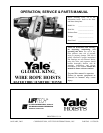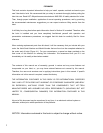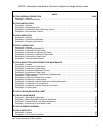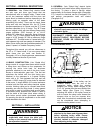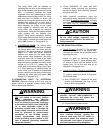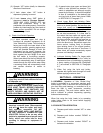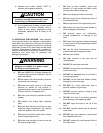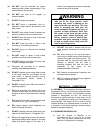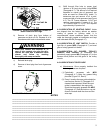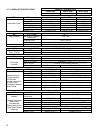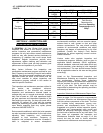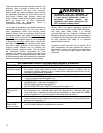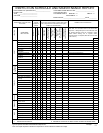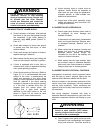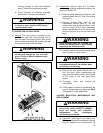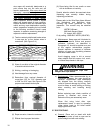
8
dd) DO NOT use limit switches as routine
operating stops unless recommended. They
are emergency devices only.
ee) DO NOT use hoist to lift, support, or
transport people.
ff) DO NOT lift loads over people.
gg) DO NOT leave a suspended load un-
attended unless specific precautions have
been taken.
hh) DO NOT allow sharp contact between two
hoists or between hoist and obstructions.
ii) DO NOT allow the rope or hook to be used
as a ground for welding.
jj) DO NOT allow the rope or hook to be
touched by a live welding electrode.
kk) DO NOT remove or obscure the warnings
on the hoist.
ll) DO NOT adjust or repair a hoist unless
qualified to perform hoist maintenance.
mm) DO NOT attempt to lengthen the wire rope
or repair damaged wire rope.
nn) Personnel not physically fit or properly
qualified, shall not operate hoist.
oo) DO NOT operate hoists unless hook moves
in the same direction as indicated on the
push button. If opposite direction occurs,
see pre-operation checks, Section II
Paragraph 2-4.b.
pp) DO NOT operate hoist unless limit switch is
operating properly.
qq) DO avoid operating hoist when hook is not
centered under hoist. Avoid side pulls and
swinging of load or load hook when traveling
hoist.
rr) DO operate hoist within recommended duty
cycle and do not “jog” unnecessarily.
ss) DO conduct regular visual inspections for
signs of damage and wear.
tt) DO NOT operate hoist with hooks that have
opened up. See Section V, Paragraph 5-2.f.
uu) DO provide supporting structure that has an
appropriate design factor based on the load
rating and dead weight of the hoist. If in
doubt of the supporting structure’s strength,
consult a structural engineer.
WARNING
DO NOT operate hoist with the hoisting
rope out of the drum grooves. Such
operation may result in damage to the
rope and/or the rope breaking. This may
result in dropping the load that can
cause damage to equipment and injury to
operator or other personnel. Hoist rope
will remain in the drum grooves during
operation under normal operating con-
ditions, however, slack or kinked rope,
excessive side pulls, swinging or jerking
of load, or similar abuse, may cause the
rope to leave the grooves.
vv) DO NOT use hoist in location that will not
allow operator movement to be free of the
load.
ww) DO, when starting to lift, move the load a
few inches at which time the hoist should be
checked for proper load holding action. The
operation shall be continued only after the
operator is assured that the hoist is
operating properly and that the load is
supported in the center of the
base/bowl/saddle of the hook.
xx) DO Observe recommended inspection and
maintenance procedures.
yy) DO Use common sense and best judgment
whenever operating a hoist.
SECTION IV – LUBRICATION
4-1. GENERAL. The lubrication services outlined in
Paragraphs 4-3 thru 4-6 should be performed before
initial operation of the hoist. The lubrication services
outlined in Paragraphs 4-2 thru 4-6 should be
performed at regular intervals at least every six (6)
months, coinciding with spring and fall seasons is
recommended. The reason for this is that on hoists
installed outside or in unheated areas a “cold test” oil
is required in such (below freezing) climates making
seasonal changes necessary.
4-2. CHANGING GEARCASE OIL.
a) Add 5% solution of Mobilsol A (or
equivalent) to the oil and run for a short
time. This will clean components and hold
particles in suspension for draining.



